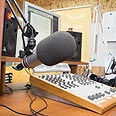
Palestinians launch online radio network
In first attempt of its kind in PA territories, collection of six new community stations addressing under-exposed issues about to hit airwaves – over Internet
This week, in the first attempt of its kind in the Palestinian territories, a collection of six new community stations will hit the airwaves – over the Internet.
The Palestinian News Network (PNN) will join nearly 70 traditional broadcasts already operating in the Palestinian Territories and a few online stations in the West Bank, like the music-only Maestro Beat in Ramallah and the channel in the Nabi Saleh village that focuses exclusively on the Palestinian popular resistance.
The United Kingdom's Foreign and Commonwealth office, through its Community Media Solutions department, supported PNN’s initial idea.
Waiting for the last technological touch-ups, each one of the six new stations will cover a specific topic and be supervised by a local community organization.
In Bethlehem, Miftah radio will focus on matters of the Palestinian refugees in the region, while Reef will report about daily life in that city’s eastern villages.
Burj al-Nawateer will address issues facing the suburbs of east Jerusalem, such as the lack of water and sanitation, and the al-Bayader station in Jenin will specialize in agriculture.
In the Gaza Strip, the Nisa’ Two station will discuss women’s issues while Shabab radio delves into the life and culture of the youth there.
The stations will be housed in community centers in each city, expect for Burj al-Nawateer, covering Jerusalem, which will broadcast from a volunteer's home in the village of Nabi Samuel.
Mohammed Ayesh, a 21-year-old media student in Al-Quds University, will be one of the people presenting a show on Burj al-Nawateer. As a student in his final year, Ayesh told The Media Line he is looking for experience in radio that could also lead to a paying job.
“I hope that I will be able to serve the community and also improve my skills,” he said.
Media training
Organizers of the Palestinian News Network noticed that local news outlets are covering only headline stories in large cities, ignoring marginalized areas.
“Some areas were out of the media’s sight and interest because they are far, and not profitable,” Munjid Jado, PNN’s director, told The Media Line.
To get started, the stations don’t need much: One computer, a few software programs, a domain name, a microphone and headsets. The only missing piece is staff.
Aiming to serve local communities, the new stations will be run by young volunteer activists.
“We discussed with the Ministry of Information the concern of having stations run by non-professionals,” Jado said, adding that PNN will organize media trainings for those stations that don’t have journalism students on board while others will use media students from local universities to run the stations.
Stations will initially broadcast a few hours a day, with the goal of expanding airtime in the future.
“The main programs will be talk shows with regular guests,” Jado explained. “We hope to have the capacity to receive call-in guests.”
The success of the first community online radio implemented a few months ago in Dahriyeh, south of Hebron, led PNN to expand the idea. Business owners in the area played the station in their stores and in public spaces.
“Everybody wanted to listen to their issues being discussed on the radio,” Jado said.
Munther Amireh, who is responsible for the Miftah station and is head of Ayeda Youth Club in the Ayeda Refugee Camp in Bethlehem, told The Media Line that the problems Palestinian refugees confront should be discussed.
“Aside from political issues, refugees face severe conditions in their daily lives,” he said. “We hope to make a better connection and networking between the refugees, wherever they are. After all, they share a mutual experience.”
Traditional radio stations need a license from the Palestinian Authority, since the PA is assigned certain frequencies, pending they don’t interfere with Israel.
Three different government institutions oversee these licenses. The Ministry of Information reviews technical and professional issues, the Telecommunications Ministry cares about the airwaves, and the Ministry of Interior gives security clearance.
According to current Palestinian law, online stations don’t need to be licensed.
“All media outlets on the Internet are not required by law to register for a license,” said Mohammed Abu Halaweh, Director of the radio and television department in the Ministry of Information. “Some choose to do it willingly as a protection in case they get hacked, but until now we don’t have any online radio that is registered in the ministry.”
Currently, the Palestinian territories follow a print and publication law, in place since 1995. A draft of a new visual and audio law, which was prepared by the Ministry of Information, is awaiting the president’s approval.
The president is responsible for passing new laws in the absence of the Palestinian Legislative Council due to the Palestinian split. It is unclear when this law will be considered.
The Ministry of Information stopped granting licenses to new radio stations due to a rise in requests, but they consider new licenses if they see added value to the community, Abu Halaweh said.
One third of Palestinians use the Internet according to a survey done in 2011 by the Palestinian Bureau Statistics. Around 55% of young people in the Territories are now online, compared to 5% in 2004.
While it is unclear how many people listen to traditional radio stations here, the broadcast websites hope to track listenership in the future.
“The aim is to transform these stations to the FM waves in the future. But we are studying it with the Ministry of Information to be able to do it without fees and taxes as we only wish to serve the societies,” Jado said.
Article written by Diana Atallah
Reprinted with permission from The Media Line










